- Home
- Tobias Wolff
In Pharaoh's Army: Memories of the Lost War Page 5
In Pharaoh's Army: Memories of the Lost War Read online
Page 5
His name was Hugh Pierce. He was from Philadelphia. It turned out that we’d gone to rival prep schools. To come across anyone from that life here was Strange enough, but I didn’t give the coincidence much thought. We hardly ever talked about our histories. What had happened to us up to then seemed beside the point. Histories were what we’d joined the army to have.
For three weeks the drill sergeants harried us like wolves, alert to any sign of weakness. Men started dropping out. Hugh loved it. The more fantastic the oppressions, the greater his delight. He couldn’t stop himself from grinning his wiggy grin, bouncing on the balls of his feet as he waited for the next absurdity. Whenever the drill sergeants caught him smiling they swarmed all over him, shouted dire threats directly into his ears, made him do push-ups while they sat on his back. Nothing got to him. His pleasure in the ridiculous amounted almost to a pathology. And they couldn’t wear him down, he was too strong for that—immensely strong, and restless in his strength. Unlike me, Hugh made a habit of helping men who dropped back on our runs, mostly out of generosity, but also because to him exertion was joy. He liked making it harder for himself, pushing the limits however he could. At night, when the last drill instructor had exacted the last push-up and pronounced the last insult, we fell into our bunks and made wisecracks until sleep got us. But for me the joke was wearing a little thin. By now I was mainly trying to keep up.
In the last week we jumped. We jumped every day. For hours each morning we waited on the tarmac, running in place, doing push-ups and equipment checks while the drill sergeants went through all the possibilities of getting lunched. They dwelt in loving detail on the consequence to our tender persons of even the slightest accident or mistake. Did anyone want to reconsider? Just step to the side. Always, some did. Then we boarded the planes, facing one another across the aisle until the green light came on and the jumpmaster gave the order to stand and hook up our static lines. To psych ourselves for the plunge we sang “My Girl” in falsetto and danced the Stroll, swinging our shoulders and hips, flapping our wrists feyly as we made our way down the cargo bay to the open door of the plane. The planes were C-130 turboprops. The prop blast was tremendous, and you jumped right into it. It caught you and shot you back feetfirst spinning like a bullet. You could see the earth and sky whirling around your boots like painted sections on a top. Then the chute snapped open and stopped you cold, driving your nuts into your belly if you didn’t have the harness set right, snatching you hard even if you did. The pain was welcome, considering the alternative. It was life itself grabbing hold of you. You couldn’t help but laugh—some of us howled. The harness creaked as you swung back and forth under the luminous white dome of the silk. Other chutes bloomed in the distance. The air was full of men, most quiet, some yelling and working their risers to keep from banging into each other. The world was laid out at your feet: checkered fields, shining streams and ponds, cute little houses. For a time you belonged to the air, weightless and free; then the earth took you back. You could feel it happen. One moment you were floating, the next you were falling—not a pleasant change. The ground, abstractly picturesque from on high, got hard-looking and particular. There were trees, boulders, power lines. It seemed personal, even vengeful, the way these things rushed up at you. If you were lucky you landed in the drop zone and made a good rolling fall, then quick-released your parachute before it could drag you and break your neck. As you gathered in the silk you looked up and watched the next stick of troopers make the leap, and the sight was so mysterious and beautiful it was impossible not to feel love for this life. It seemed, at such a moment, the only possible life, and these men the only possible friends.
In our last week of jump school Hugh and I signed up for the Special Forces and were sent on to Fort Bragg.
The Special Forces came out of the OSS teams of World War II. They’d worked in German-occupied territory, leading partisan brigades, blowing bridges and roads, killing enemy officers. The membership was international. When I came to Fort Bragg some of the old hands were still around: Czechs, Poles, Ukrainians, Brits, Hungarians. We also had a number of Germans who had signed on after the war, more attached to the uniformed life than to any homeland.
This accented remnant gave a legionary feeling to the unit, but most of the troops were young and American. They were also tough and smart, and savvy in a way that I began to understand I was not. I could keep up with them physically, but I didn’t get the hang of things as easily as they did—as if they’d been born knowing how to lay a mortar, blow a bridge, bushwhack through blind undergrowth without ever losing their sense of where they were. Though I could do a fair impersonation of a man who knew his stuff, the act wouldn’t hold up forever. One problem was that I didn’t quite believe in it myself.
There was no single thing I had trouble with, no skill I couldn’t eventually learn. I simply ceased to inhabit my pose. I was at a distance, watching this outrageous fraud play the invisible bushman, the adept with knives, the black-faced assassin willing at the drop of a hat to squeeze the life out of some total stranger with piano wire. And in that widening distance between the performance and the observation of the performance, there grew, subtly at first, then intrusively, disbelief and corrosive irony. It was a crisis, but I hardly recognized its seriousness until one achingly pure spring day at the sawdust pit where we practiced hand-to-hand combat.
We were on a smoke break. I lay on my back, staring up at the sky. Our two instructors were sitting behind me on the wall of sandbags that surrounded the pit. One of them had just received orders for Vietnam and was saying he wouldn’t go back, not this time. He’d already done two six-month tours, and that, he said, was enough. The other sergeant murmured commiseration and said he could protest the orders but it probably wouldn’t do any good. He didn’t seem at all surprised by this show of reluctance, or even falsely sympathetic. He sounded troubled. I’m not going, the sergeant with the orders kept saying. I’m not going.
Both of them were dull the rest of the session. They just went through the motions.
This set me thinking. Here you had a man who knew all the tricks and knew them well enough to teach them to others. He’d been there twice and been competent enough to get home. Yet he was afraid. He was afraid and didn’t bother to hide it from another man who’d been there, certain it wouldn’t be held against him. What sort of knowledge did they share, to have reached this understanding?
And if this sergeant, who was the real thing, had reason to be afraid, what about me? What would happen when my accounts came due and I had to be in truth the wily, nerveless killer I pretended to be? It was not my habit to meditate on this question. It came to me unbidden, breaking through the bluff imitation of adequacy I tried so hard to believe in.
I never unloaded my worries on Hugh. I didn’t hide them, but when we were out on a tear they ceased to trouble me. We patrolled Fayetteville on our nights off and spent the weekends cruising farther afield in Hugh’s Pontiac, to Myrtle Beach and Chapel Hill and down to Fort Gordon, Georgia, where his brother was stationed. Yak, yak, yak, all the way. Girls. The peculiarities of our brothers-in-arms. Books—at least I talked about books. And of course the future. We had big plans. After we got out of the army we were going to get all our friends together and throw the party of the century. We were going to buy motorcycles and bazooka through Europe. We were going to live. It’s been almost thirty years now and the words are mostly gone, but I remember the ecstatic rush of them, and the laughter. I could make Hugh laugh pretty much at will. It was a sight: crimson circles appeared on his high cheeks, his eyes brightened with tears, he wheezed for breath. He could do the same thing to me. We were agreed that the world was a comical place, and that we’d been put here for the sacred purpose of being entertained by it.
And we sang; how we sang. Hugh had uncanny rhythm. He could do scat. He could imitate a bass, a muted trumpet. He had a good voice but preferred to sing harmony and backup while I took the lead. We did old Mills Brothers so
ngs, the Ink Spots, Sinatra. A couple of the girls we went out with were always after us for “The Best Is Yet to Come.” That was our big gun. I laid down the melody while Hugh did crazy riffs around it, shoulders jumping, eyes agleam, head weaving like a cobra’s. We might have been pretty good. Then again, maybe we weren’t.
This was 1965. The air force had started bombing North Vietnam in February. The marines were in Danang, and the army had forty-four combat battalions on the way. Plenty of guys we knew were packing up for the trip. Hugh and I were going too, no question about that, but we never talked about the war. I can guess now that the reckless hilarity of our time together owed something to our forebodings, but I didn’t suspect that at the time. Neither of us acknowledged being afraid, not to each other. What good would that do? We had chosen this life. My reasons were personal rather than patriotic, but I had consented to be made use of, and in spite of my fears it never occurred to me, nor I’m sure to Hugh, that we would be used stupidly or carelessly or for unworthy ends. Our trust was simple, immaculate, heartbreaking.
That fall Hugh got sent for medic’s training to Fort Sam Houston in Texas. I was at loose ends and bored. My company commander had been working on me to apply for Officer Candidate School, and I finally agreed. I took some tests and went before a panel of generals and colonels who took note of my command presence and pronounced me officer material. They told me I’d be on my way in a month or so.
While I was awaiting my orders I got a letter from one of the girls Hugh had gone out with. Her name was Yancy. She said she was pregnant and that Hugh was the father. She knew he’d left Fort Bragg but didn’t know where to find him, and asked me to send her his address and let him know the situation. I got this letter on a Saturday afternoon. The building was empty. I sat on my bunk and tried to think what to do. Yancy was the friend of a girl named Trace I’d gone out with. The two of them roomed together, tending bar and living it up on terms as hedonistic as ours, or so it seemed to me. I hadn’t seen either of them since Hugh left, and I didn’t know what to make of this. Was I honestly supposed to believe that Hugh was the only man Yancy had been close to during the time in question? I supposed it was just possible. But what would Hugh think if I gave her his address, or if I sent him the message she wanted me to send? Would he think I was meddling, taking her side? Judging him? I understood that the strongest friendship can be spoiled by a word, a tone, even an imagined tone.
Why had she written me, anyway? It didn’t matter where he was, if she’d addressed the letter to Hugh it would have been forwarded. Maybe she didn’t know his last name. Did he not want her to know?
I put the letter away. I would consider it, then come to a decision. But I never could decide. The standard by which Hugh and I tried to live was loyalty, and I’d always thought it was a good one. In the face of the Other we closed ranks. That worked fine when the Other was a bullying sergeant or a bunch of mouthy drunks, but it didn’t shed much light here, where she was a girl in trouble. I could sense the insufficiency of the code but had no stomach for breaking it, at the risk of betraying Hugh. In the end I did nothing. I let other matters claim my attention.
MY ORDERS came. Instead of sending me to the infantry school at Fort Benning, they assigned me to artillery Officer Candidate School at Fort Sill, Oklahoma. I felt both guilty and relieved. Since the Special Forces had no howitzers they could not reasonably send me back there. My logic was impeccable, but six months later, with twenty years of life under my belt and new gold bars on my shoulders, I opened my orders and saw that I was going right back where I started, to Fort Bragg and the Special Forces.
My position was absurd. While laboring to become an artilleryman I had acquired a body of skills now utterly useless to me—trigonometry! calculus!—and lost or grown clumsy in those I needed. It was going to be hard for the troops at Fort Bragg to take me seriously as an officer when some of them had known me not long before as an enlisted man, and as something of a fuck-up. I couldn’t even take myself seriously. In my OCS class I’d finished forty-ninth out of forty-nine, the class goat—like Custer, as no one lost a chance to tell me.
It wasn’t as disgraceful as it looked. There’d been one hundred twenty of us to start with. But it was still pretty bad. I barely passed the gunnery course, and then only by pulling all-nighters in the latrine. I was chronically late and unkempt. My jocose manner amused only a few of my classmates and none of my training officers, who in their reports labeled me “extraneous” and “magic”—not a compliment in those circles—and never failed to include me in the weekly Jark, an hours-long punishment run in full field equipment, which was so effective in producing misery that people used to line the streets to watch us stumble past, as they would have gathered to watch a hanging. Some bystanders were actually moved to pity by the sight of us, and slipped us candy bars and words of encouragement. The true Christians among them threw water on our heads.
In the end I finished OCS only because, mainly to amuse myself, I had written a number of satirical songs and sketches for our battery to perform on graduation night. These revues, in the style of Hasty Pudding or the Princeton Triangle, were a tradition at Fort Sill and a big headache to our training officers, whose talents did not lie in this direction. Along with hundreds of other visitors, the post commandant and his staff would be in attendance. There’d be hell to pay if the show was a flop. When the time came for the final cuts to be made in our class it was discovered that I was the only one who could put the whole thing together.
They kept me on to produce a farce. That was how I became an officer in the United States Army.
ONE BY ONE Hugh and my other buddies disappeared into the war. I kept waiting for my own orders. At last I did get orders, but instead of Vietnam they sent me to the Defense Language Institute in Washington, D.C., to study Vietnamese for a year. Most of the students were young Foreign Service officers. So I wouldn’t stick out too much, I was detached from the army and put on civilian status. I could live where I wanted to live. I reported to no one, and no one checked up on me. My only duty was to learn Vietnamese. On top of my regular salary I got per diem for food, housing, and civilian clothes. Before leaving Fort Bragg I was issued a pamphlet showing in detail the kind of mufti an officer should wear on different occasions, from clambakes to weddings. Each “Correct” picture was paired with an “Incorrect” picture—goateed beatniks in shades and sandals, hipsters in zoot suits, doughy proles in bermudas and black socks. The correct guys always wore dark blue suits except when they were doing their morning run.
It wasn’t a hardship post. My mother still lived in Washington and so did my brother, Geoffrey, and his wife, Priscilla. I had some good friends in town as well, guys I’d known from school days and kept in touch with during my leaves home. Laudie Greenway, in town for a last fling before joining the army himself. George Crile, studying at Georgetown and working as a stringer for Drew Pearson. Bill Treanor, about to open the first home in Washington for runaway kids. We threw in together and rented a house not far from Dupont Circle. Our landlady was Jeane Dixon, the newspaper sibyl who’d become famous by predicting the deaths of President Kennedy and Dag Hammarskjöld. She collected the rent in person, but not from me. As soon as her car pulled up I went running out the back door before she had a chance to see me and start prophesying. In all the time I lived there I never once let her lay eyes on me.
I bought a Volkswagen and took girls to Wolf Trap and the Cellar Door. I smoked dope. I began a novel, which, somewhat to my surprise, I managed to work on in a fairly disciplined way. I fell in love.
Her name was Vera. She was related by marriage to a Russian prince, and had grown up among expatriate Russians and come to think of herself as one of them. She had their wounded gaiety, their air of romantic, genteel displacement, their manners and terms of address. Her grandfather she called Opa; her brother Gregory, Grisha. She hated to cook, but when she had no choice she made great borscht. She favored high boots and bright skirts and scar
ves such as a Russian princess might wear while at leisure among her beloved serfs, picking mushrooms or hunting bears or dancing to the balalaika. She drank like a man and ate like a wolf. I fell in love with her the first night I saw her and pursued her for weeks afterward. I loved her name, her odd swinging stride, her dark wit and mad laugh, her clothes, her pale skin and antique, heart-shaped face. She had a steady boyfriend but I kept after her anyway until finally she surprised us both by falling in love with me. Her best friend, the girl who’d introduced us, took me aside and told me I was in way over my head. I didn’t know what she was talking about, but I began to learn.
She could be very funny, my Vera, but her humor was desperate and biting. She was obsessed by a single terrible truth, that everything and everyone you love will someday be taken from you. For Vera all other truths were frivolous; this was the one that mattered. Her father had been her closest friend. He had told her his secrets. They had conducted ESP experiments together—successfully, according to Vera. She had lost him suddenly, without any warning, when she was in her first year of boarding school, and the pain that came upon her then had never left her. She saw everything through it.
And as if it weren’t enough by itself, this unhealing wound was endlessly abraded by anger, anger at the world for being a place where such a thing could happen. She wouldn’t have said so herself, but her father’s death left her feeling deserted. And because she was convinced that everyone else would desert her in the end, she was always looking for the first signs. Just about everything was a sign. A quizzical look, failure to agree, reference to experience not shared with her, private sorrow, old loyalties. Anything could qualify. And her rage at such betrayals was uncontainable.

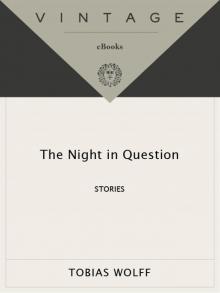 The Night in Question: Stories
The Night in Question: Stories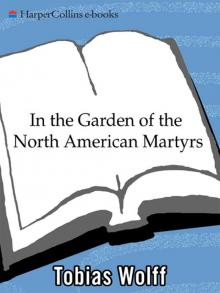 In the Garden of the North American Martyrs
In the Garden of the North American Martyrs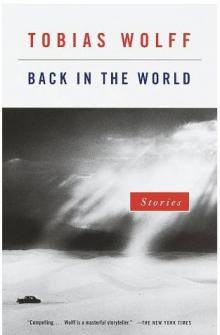 Back in the World: Stories
Back in the World: Stories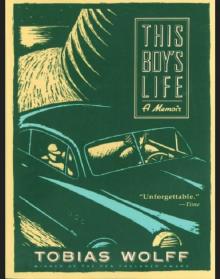 This Boy's Life
This Boy's Life Old School
Old School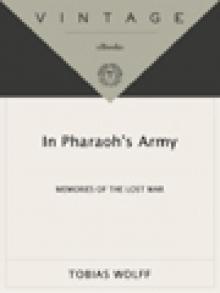 In Pharaoh's Army: Memories of the Lost War
In Pharaoh's Army: Memories of the Lost War Our Story Begins: New and Selected Stories
Our Story Begins: New and Selected Stories The Barracks Thief
The Barracks Thief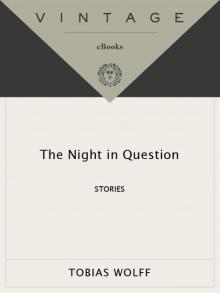 The Night In Question
The Night In Question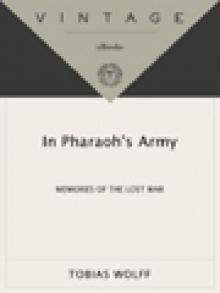 In Pharaoh's Army
In Pharaoh's Army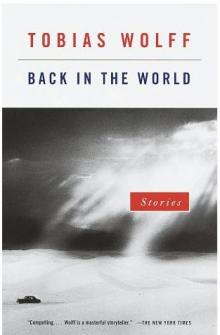 Back in the World
Back in the World